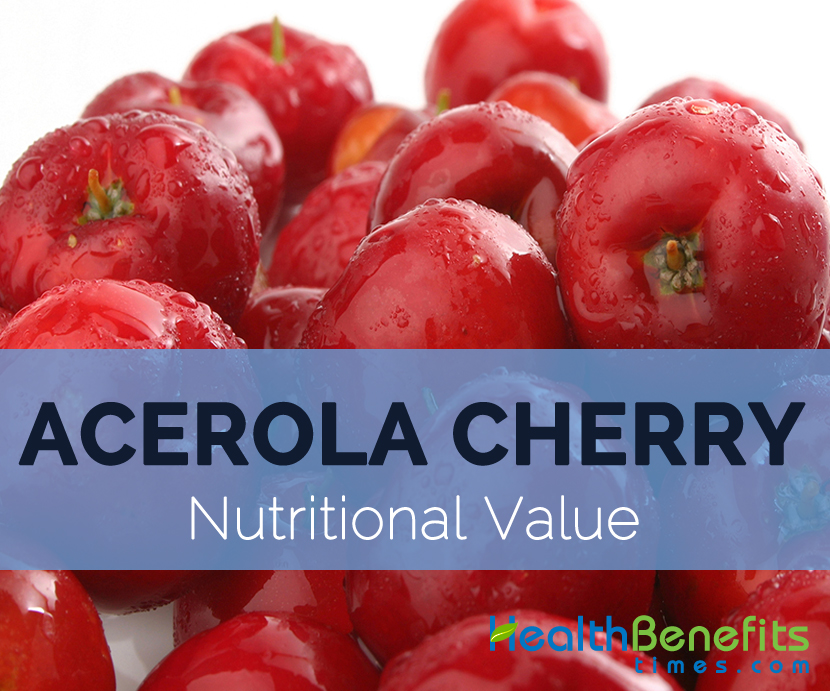 Acerola Cherry provides outstanding variety of flavonoids (cyaniding, Pelargonidin, Kaempferol and Quercetin). Acerola Cherries are an excellent source of Vitamin C. They are also good source of dietary fiber, Vitamins, calcium, iron, zinc, potassium, copper, magnesium and sodium.
Acerola Cherry provides outstanding variety of flavonoids (cyaniding, Pelargonidin, Kaempferol and Quercetin). Acerola Cherries are an excellent source of Vitamin C. They are also good source of dietary fiber, Vitamins, calcium, iron, zinc, potassium, copper, magnesium and sodium.
Nutritional value of Acerola cherry
Serving Size:1 Cup (98 g)
Calories 31 Kcal. Calories from Fat 2.61 Kcal.
| Proximity | Amount | % DV |
|---|---|---|
| Water | 89.58 g | N/D |
| Energy | 31 Kcal | N/D |
| Energy | 131 kJ | N/D |
| Protein | 0.39 g | 0.78% |
| Total Fat (lipid) | 0.29 g | 0.83% |
| Ash | 0.2 g | N/D |
| Carbohydrate | 7.54 g | 5.80% |
| Total dietary Fiber | 1.1 g | 2.89% |
| Minerals | Amount | % DV |
|---|---|---|
| Copper, Cu | 0.084 mg | 9.33% |
| Magnesium, Mg | 18 mg | 4.29% |
| Potassium, K | 143 mg | 3.04% |
| Iron, Fe | 0.2 mg | 2.50% |
| Phosphorus, P | 11 mg | 1.57% |
| Calcium, Ca | 12 mg | 1.20% |
| Selenium, Se | 0.6 µg | 1.09% |
| Zinc, Zn | 0.1 mg | 0.91% |
| Sodium, Na | 7 mg | 0.47% |
| Vitamins | Amount | % DV |
|---|---|---|
| Vitamin C (Ascorbic acid) | 1644 mg | 1826.67% |
| Vitamin B5 (Pantothenic acid) | 0.303 mg | 6.06% |
| Vitamin A | 37 µg | 5.29% |
| Vitamin B2 (Riboflavin) | 0.059 mg | 4.54% |
| Vitamin B9 (Folate, Folic acid) | 14 µg | 3.50% |
| Vitamin B3 (Niacin) | 0.392 mg | 2.45% |
| Vitamin B1 (Thiamin) | 0.02 mg | 1.67% |
| Vitamin B6 (Pyridoxine) | 0.009 mg | 0.69% |
| Lipids | Amount | % DV |
|---|---|---|
| Fatty acids, total saturated | 0.067 g | 0.10% |
| Myristic acid (tetradecanoic acid) 14:00 | 0.002 g | N/D |
| Palmitic acid (hexadecanoic acid) 16:00 | 0.047 g | N/D |
| Stearic acid (octadecanoic acid) 18:00 | 0.016 g | N/D |
| Fatty acids, total monounsaturated | 0.08 g | N/D |
| Palmitoleic acid (hexadecenoic acid) 16:1 | 0.001 g | N/D |
| Oleic acid (octadecenoic acid) 18:1 | 0.079 g | N/D |
| Fatty acids, total polyunsaturated | 0.088 g | 0.52% |
| Linoleic acid (octadecadienoic acid) 18:2 | 0.045 g | N/D |
| Linolenic acid (Octadecatrienoic acid) 18:3 | 0.043 g | N/D |
| Flavonoids | Amount | % DV |
|---|---|---|
| Anthocyanidins | ||
| Cyanidin | 15.4 mg | N/D |
| Pelargonidin | 6.7 mg | N/D |
| Flavonols | ||
| Kaempferol | 1 mg | N/D |
| Quercetin | 4.6 mg | N/D |
*Above mentioned Percent Daily Values (%DVs) are based on 2,000 calorie diet intake. Daily values (DVs) may be different depending upon your daily calorie needs. Mentioned values are recommended by a U.S. Department of Agriculture. They are not healthbenefitstimes.com recommendations. Calculations are based on average age of 19 to 50 years and weighs 194 lbs.
Source: USDA

